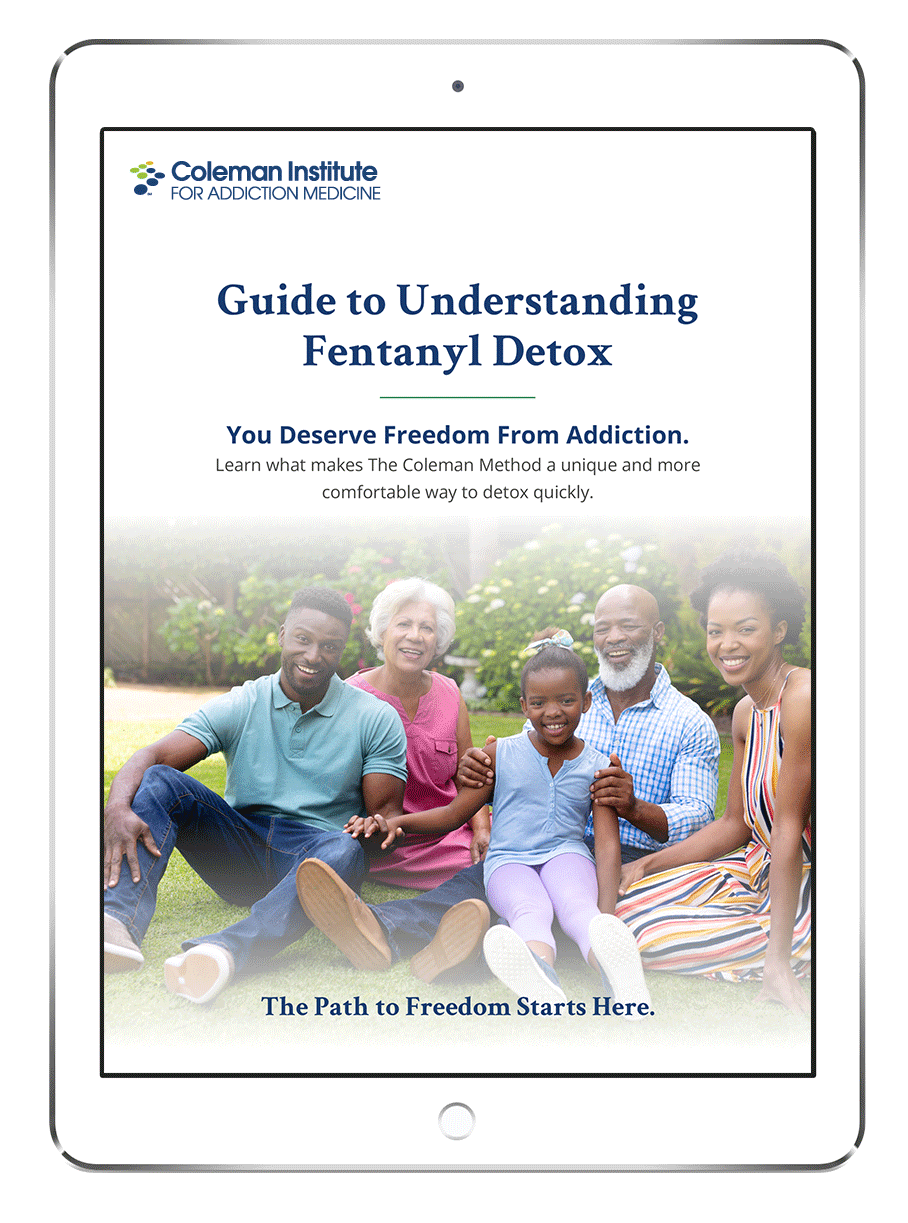Fentanyl Detox
The Coleman Method is a safer, faster, and more comfortable way to start your journey toward recovery.
Outpatient Fentanyl Detox Treatment
Why Choose a Medical Detox off of Fentanyl?
Fentanyl—a significant contributor to the opioid crisis—is a powerful synthetic opioid. It is readily available on the streets because it is cheap to manufacture and up to 50 times more potent than heroin. In many cases, people do not even realize the drug they are purchasing contains deadly Fentanyl.
Fentanyl addiction can occur after only a few uses, and withdrawal is painful. That’s why the Coleman Institute created an outpatient rapid Fentanyl Detox treatment. Our outpatient Fentanyl Detox has a 98% completion rate and can be finished in as little as 5 days.
How Does the Coleman Method For Fentanyl Withdrawal Management Work?
The Coleman Method uses non-addictive drugs and comfort medications to remove Fentanyl from the brain in the fastest, most comfortable way possible.
Our Fentanyl Detox is medically supervised and is a safer, more comfortable experience than self-detoxing. Plus, with no hospital stay required, there’s minimal disruption to your life. Patients who live nearby are able to spend nights at home in the comfort of their bed. After completing your rapid Fentanyl Detox, we work with you to treat any post-acute withdrawal symptoms so you can strengthen your recovery and sobriety.
Substance Use Disorder for Fentanyl
How Does Fentanyl Use Become an Addiction?
Many patients within healthcare facilities become dependent on or addicted to Fentanyl by accident. They may have been given Fentanyl by a physician after an accident, surgery, or other condition that has caused chronic pain, and took their medicine as prescribed. But even after taking the prescribed synthetic opioid for a short period, they can become dependent on it.
Even those using street opioids like heroin can find themselves dependent on or addicted to Fentanyl. This is because it is so powerful and cheap to manufacture that many street drugs have been cut with, or even replaced by Fentanyl. This dangerous, highly addictive opioid often becomes a new addiction for those already suffering from a dependence on opioids.
Facts About Fentanyl
Fentanyl is a powerful synthetic opioid that is driving the recent increase in opioid-related deaths and cases of Substance Use Disorder (SUD). The Opioid Crisis has already caused enormous waves of suffering due to overdoses, broken families, and nation-wide emotional upheaval, with an economic toll estimated to be $78 billion per year.
There are various reasons for the rise of Fentanyl use and dependence in the U.S. Perhaps the most impactful is that it is less expensive than heroin and much more potent, making it easier to produce, smuggle, and store. Many individuals using heroin, cocaine, opioids, benzodiazepines, and even marijuana do not realize that the drugs they have purchased on the black—or gray—market contain Fentanyl. A lot of our detox patients are stunned that we detect Fentanyl in their urine.
- The DEA has seized 1.8 million counterfeit pills containing Fentanyl over a recent 2 month period.
- In 2021, 70,000 passed away due to overdoses on synthetic opioids—primarily Fentanyl.
- Fentanyl is 50 to 100 times more potent than morphine.
- Over 9 million Americans misused pain pills in 2020, many of which contained Fentanyl.
- The American Rescue Plan Act, signed into law in 2021, sets aside funds for mental health and Substance Use Disorder programs addressing the Opioid Crisis fueled by Fentanyl.
What Are The Signs Of Fentanyl Addiction?
Just like other opioids, an individual taking Fentanyl—legally or not—can develop a tolerance over time. Since Fentanyl is short-acting, and very potent, abruptly stopping can lead to painful withdrawal symptoms. Fentanyl binds tightly to the brain’s opioid receptors, which makes self-detox extremely difficult. Fentanyl is also lipophilic (meaning it likes to hide in fat cells), which means it can take a long time for all of the Fentanyl in someone’s body to wear off.
- Obsession and fixation on securing more Fentanyl
- Anxiety and depression
- Inability to maintain life responsibilities
- Disinterest in former passions
- Using higher doses of the drug, and in higher frequency, to maintain the same feeling
- Lying about usage
- Experiencing withdrawal symptoms when the drug isn’t available
What Are The Symptoms Of Fentanyl Withdrawal?
When someone is dependent on or addicted to Fentanyl, the brain’s chemical makeup has changed. Abruptly stopping Fentanyl use can lead to withdrawal symptoms. Although these symptoms can vary, they are painful, uncomfortable, and can be dangerous.
Navigating withdrawal symptoms can be a long, difficult and painful path—even more so when attempted without professional medical assistance. Common Fentanyl withdrawal symptoms can include:
- Aches and pains throughout the body, including within the muscles and bones
- Dilated pupils
- Severe abdominal cramping
- Runny nose
- Fatigue
- Confusion
- Nausea, vomiting, and diarrhea
- Insomnia
- Fever
- Sweating, including cold sweats
Find An Outpatient Detox Near You
The Coleman Institute offers a variety of outpatient detox treatment options at locations nationwide. Our ground-breaking Coleman Method has helped thousands of patients recover from the effects of addiction. Whether you want to detox from opiates or alcohol, we can help.
Featured Fentanyl Detox FAQs
See What Other Patients are Saying about Coleman Institute…
Whitney – Former Opioid User
“This couldn’t have been a better experience – there’s just so much personalized attention.”
Dustin – Former Opioid User
“I’m free and clear of the bondage of my addiction.”
Ready to Reclaim Your Life?
Get back to being yourself with our safe and effective method for rapid fentanyl detox.






